贵州省贵阳市2021年中考英语一轮复习教材复习课件:七年级上册Units 1-4课件(105张PPT)
文档属性
| 名称 | 贵州省贵阳市2021年中考英语一轮复习教材复习课件:七年级上册Units 1-4课件(105张PPT) | 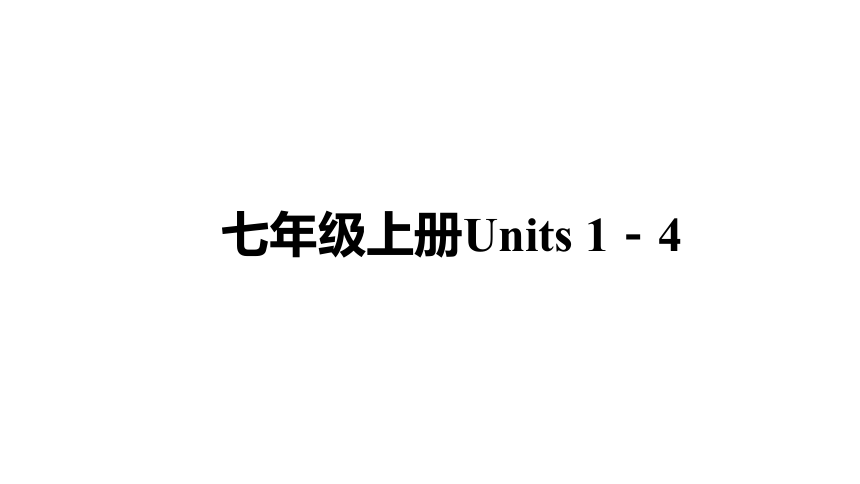 | |
| 格式 | pptx | ||
| 文件大小 | 888.9KB | ||
| 资源类型 | 教案 | ||
| 版本资源 | 通用版 | ||
| 科目 | 英语 | ||
| 更新时间 | 2021-02-17 16:19:53 | ||
图片预览

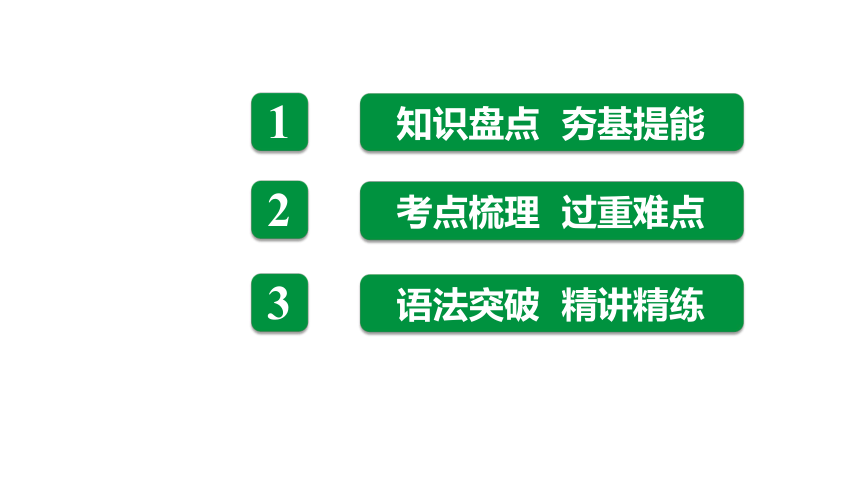

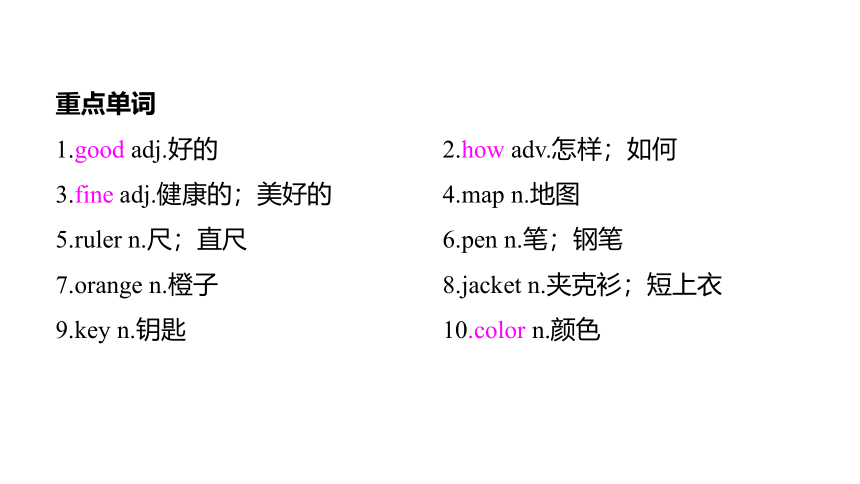

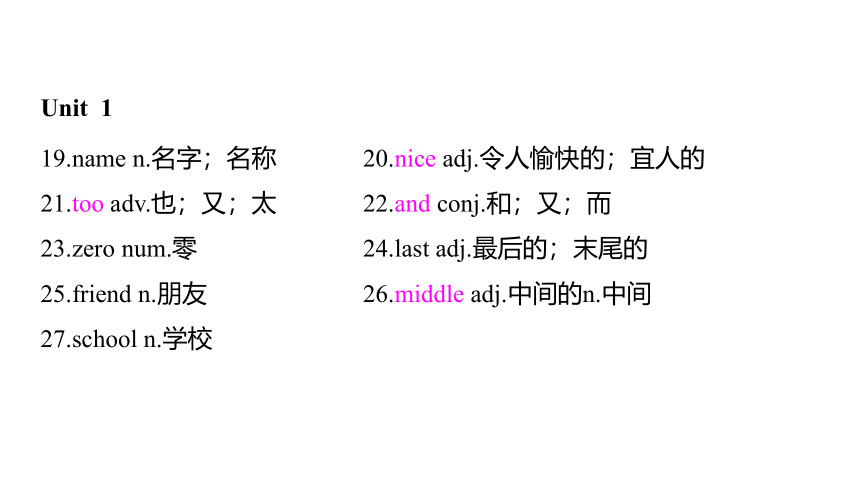
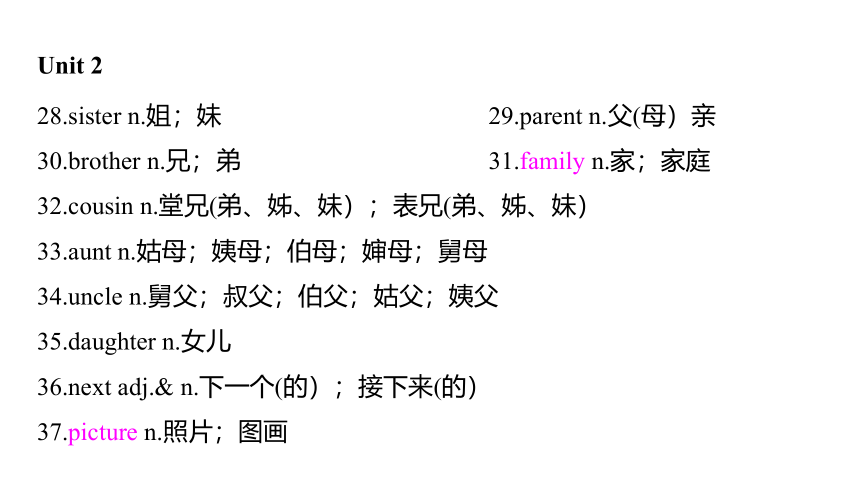
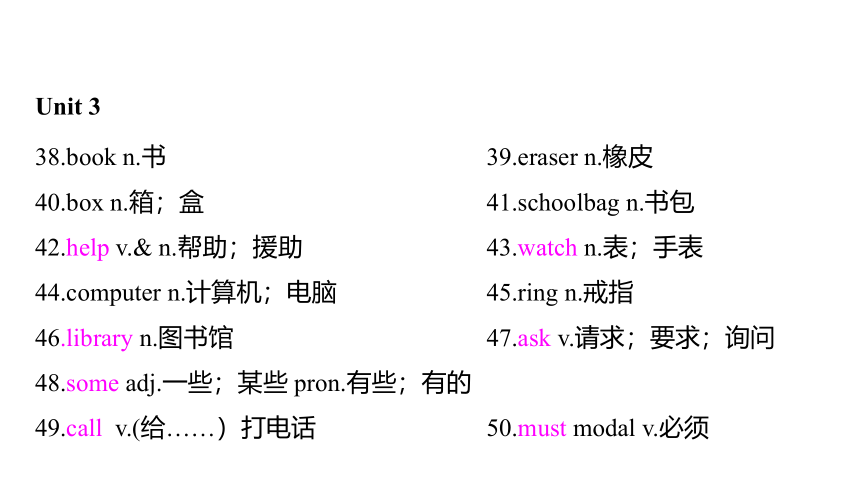
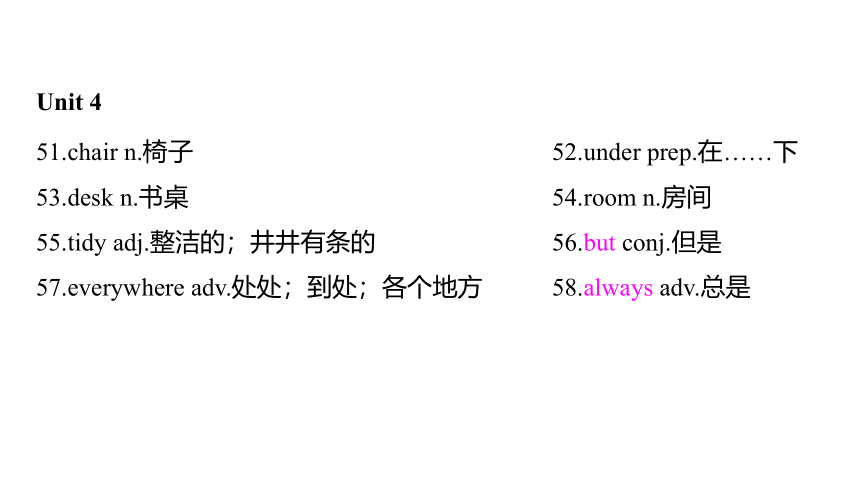
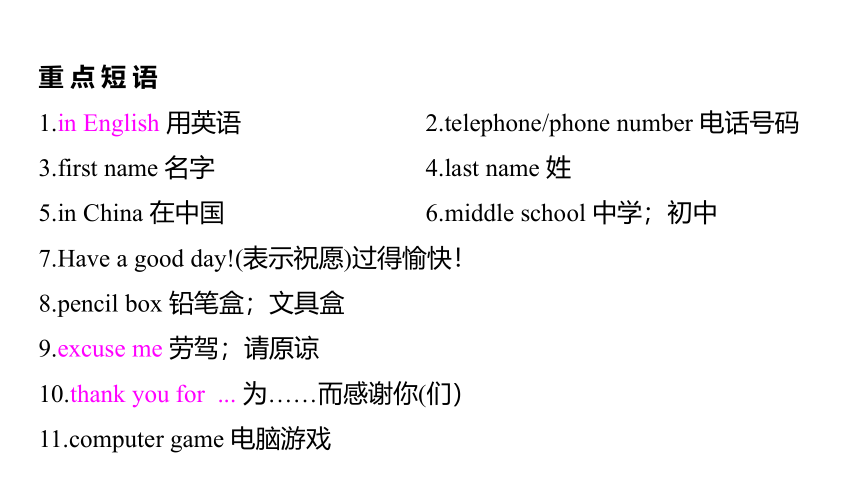
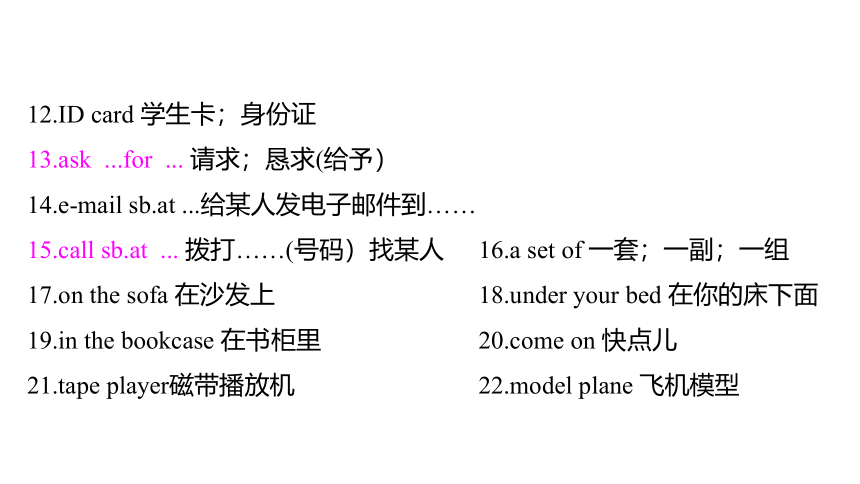
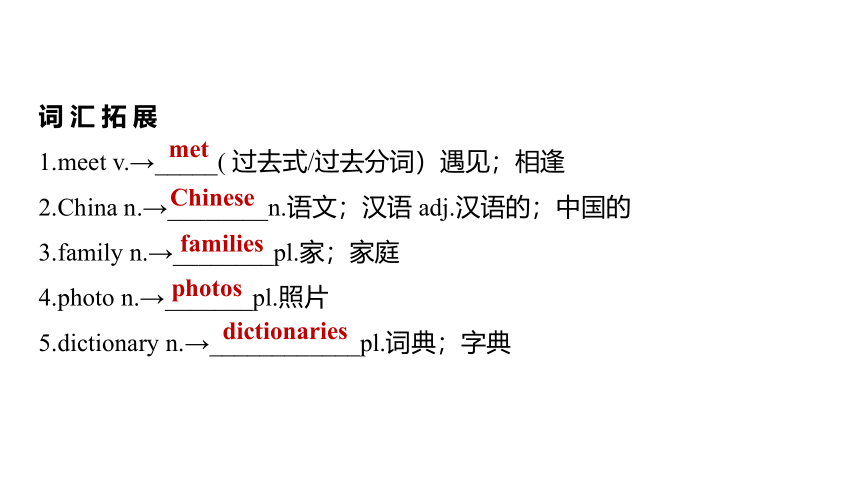
文档简介
七年级上册Units
1-4
1
知识盘点
夯基提能
2
考点梳理
过重难点
3
语法突破
精讲精练
知识盘点
夯基提能
重点单词
1.good
adj.好的
2.how
adv.怎样;如何
3.fine
adj.健康的;美好的
4.map
n.地图
5.ruler
n.尺;直尺
6.pen
n.笔;钢笔
7.orange
n.橙子
8.jacket
n.夹克衫;短上衣
9.key
n.钥匙
10.color
n.颜色
11.red
adj.&
n.红色(的)
12.yellow
adj.&
n.黄色(的)
13.green
adj.&
n.绿色(的)
14.blue
adj.&
n.蓝色(的)
15.black
adj.&
n.黑色(的)
16.white
adj.&
n.白色(的)
17.purple
adj.&
n.紫色(的)
18.brown
adj.&
n.棕/褐色(的)
19.name
n.名字;名称
20.nice
adj.令人愉快的;宜人的
21.too
adv.也;又;太
22.and
conj.和;又;而
23.zero
num.零
24.last
adj.最后的;末尾的
25.friend
n.朋友
26.middle
adj.中间的n.中间
27.school
n.学校
Unit
1
28.sister
n.姐;妹
29.parent
n.父(母)亲
30.brother
n.兄;弟
31.family
n.家;家庭
32.cousin
n.堂兄(弟、姊、妹);表兄(弟、姊、妹)
33.aunt
n.姑母;姨母;伯母;婶母;舅母
34.uncle
n.舅父;叔父;伯父;姑父;姨父
35.daughter
n.女儿
36.next
adj.&
n.下一个(的);接下来(的)
37.picture
n.照片;图画
Unit
2
38.book
n.书
39.eraser
n.橡皮
40.box
n.箱;盒
41.schoolbag
n.书包
42.help
v.&
n.帮助;援助
43.watch
n.表;手表
puter
n.计算机;电脑
45.ring
n.戒指
46.library
n.图书馆
47.ask
v.请求;要求;询问
48.some
adj.一些;某些
pron.有些;有的
49.call
v.(给……)打电话
50.must
modal
v.必须
Unit
3
51.chair
n.椅子
52.under
prep.在……下
53.desk
n.书桌
54.room
n.房间
55.tidy
adj.整洁的;井井有条的
56.but
conj.但是
57.everywhere
adv.处处;到处;各个地方
58.always
adv.总是
Unit
4
重
点
短
语
1.in
English
用英语
2.telephone/phone
number
电话号码
3.first
name
名字
4.last
name
姓
5.in
China
在中国
6.middle
school
中学;初中
7.Have
a
good
day!(表示祝愿)过得愉快!
8.pencil
box
铅笔盒;文具盒
9.excuse
me
劳驾;请原谅
10.thank
you
for
...
为……而感谢你(们)
11.computer
game
电脑游戏
12.ID
card
学生卡;身份证
13.ask
...for
...
请求;恳求(给予)
14.e-mail
sb.at
...给某人发电子邮件到……
15.call
sb.at
...
拨打……(号码)找某人
16.a
set
of
一套;一副;一组
17.on
the
sofa
在沙发上
18.under
your
bed
在你的床下面
19.in
the
bookcase
在书柜里
e
on
快点儿
21.tape
player磁带播放机
22.model
plane
飞机模型
词
汇
拓
展
1.meet
v.→_____(
过去式/过去分词)遇见;相逢
2.China
n.→________n.语文;汉语
adj.汉语的;中国的
3.family
n.→________pl.家;家庭
4.photo
n.→_______pl.照片
5.dictionary
n.→____________pl.词典;字典
met
Chinese
families
photos
dictionaries
6.I
pron.→____(宾格)我
→_____
(形容词性物主代词)我的
→______
(名词性物主代词)我的
7.he
pron.→_____
(宾格)他
→____
(形容词性物主代词/名词性物主代词)他的
8.she
pron.→_____
(宾格)她
→____
(形容词性物主代词)她的
→_____
(名词性物主代词)她的
me
my
mine
him
his
her
her
hers
9.you
pron.→____
(宾格)你(们)
→_____
(形容词性物主代词)你(们)的
→_____
(名词性物主代词)你(们)的
10.teach
v.→_______
n.老师;教师
11.watch
n.→________
pl.表;手表
12.find
v.→______
(过去式/过去分词)找到;发现
13.lose
v.→______
(过去式/过去分词)遗失;丢失
you
your
yours
teacher
watches
found
lost
15.we
pron.→_____
(宾格)我们
→______
(形容词性物主代词)我们的
→______
(名词性物主代词)我们的
e
v.→______
(过去式)来;来到
→_______
(过去分词)
17.think
v.→
_______
(过去式/过去分词)认为;想;思考
18.know
v.→______
(过去式)知道;了解
→______
(过去分词)
us
our
ours
came
come
thought
knew
known
重
点
句
型
1._____
____
two
nice
photos
__
my
family.
这儿有两张我家人的漂亮照片。
2.______
______
this
dictionary?
这本词典(是谁的)呢?
3._______
do
you
______
it?
你如何拼写它?
Here
are
of
What
about
How
spell
4.______
the
teacher
_______
it.
去老师那里拿。
5.
______me
_____
685-6034.
(请)拨打电话6856034找我。
6.I
_____
it’s
in
your
_______________
room.
我认为它在你(外)祖父母的房间里。
Ask
for
Call
at
think
grandparents
情
景
交
际
初次见面
1.—What’s
your
name?
你叫什么名字?
—Alan./I’m
Alan./My
name’s
Alan.
艾伦。/我是艾伦。/我的名字叫艾伦。
2.—Nice
to
meet
you.
见到你很高兴。
—Nice
to
meet
you,too.
见到你也很高兴。
问候他人
3.—How
are
you?
你好吗?
—I’m
fine/OK,thanks/thank
you.
我很好,谢谢。
询问与告知电话号码
4.—What's
your
(tele)phone
number?
你的电话号码是多少?
—It's/My
(tele)phone
number
is
587-6275.
(我的电话号码)是587-6275。
询问与介绍他人
5.—Is
he
Jack?
他是杰克吗?
—Yes,he
is./No,he
isn't.His
name's
Mike.
是的,他是。/不,他不是。他的名字叫迈克。
6.—Who's
she?
她是谁?
—She's
my
sister.
她是我的姐姐/妹妹。
7.—Kate,this
is
my
friend
Jane.
凯特,这是我的朋友简。
—Nice
to
meet
you,Jane.
见到你很高兴,简。
祝愿与回应
8.—Have
a
good
day!
愿你(一天)过得愉快!
—Thanks!You,too.
谢谢!愿你也一样。确认物品所属关系
9.—Is
this/that
your
pencil?
这/那是你的铅笔吗?
—Yes,it
is.It's
mine./No,it
isn't.It's
hers.
是的。它是我的。/不,不是。是她的。
10.—Are
these/those
your
books?
这些/那些是你的书吗?
—Yes,they
are./No,they
aren't.They're
Bob's.
是的。/不,不是。它们是鲍勃的。
感谢与回应
11.—Thank
you
for
your
help,Anna.
谢谢你的帮助,安娜。
—You're
welcome.
不用谢/别客气。
谈论物品位置
12.—Where's
the
schoolbag?
书包在哪儿?
—It's
under
the
table.
它在桌子下面。
13.—Are
the
keys
on
the
sofa?
钥匙在沙发上吗?
—Yes,they
are./No,they
aren't./Sorry,I
don't
know.
是的,在。/不,不在。/抱歉,我不知道。
辨认物品
14.—What's
this/that
(in
English)?
这/那个(用英语说)是什么?
—It's
an
orange.
它是一个橙子。
辨认颜色
15.—What
color
is
it?
它是什么颜色的?
—It's
red/yellow.
它是红色的/黄色的。
语
法
1.冠词
2.be动词的一般现在时
3.人称代词和物主代词
4.指示代词
5.名词的复数
6.方位介词
7.连词and
话
题
Unit
1
结交新朋友
Unit
2
家庭
Unit
3
教室里的物品
Unit
4
房子周围的事物
考点梳理
过重难点
That’s
my
family.Those
are
my
parents.
那是我的家庭。那些是我的父母。(Unit
2
P7)
【辨析】family,home与house
考点1
{5940675A-B579-460E-94D1-54222C63F5DA}单词
含义
用法
family
家庭成员;家人
用作复数名词,谓语动词用复数形式。
家庭。
看作一个整体,用作单数名词,谓语动词用单数形式。
{5940675A-B579-460E-94D1-54222C63F5DA}单词
含义
用法
home
家;家乡;故乡
指家庭成员一起生活的地方。
house
房子
主要指建筑物、住宅,可以包含若干房间(rooms)。
【图解助记】
1.Mr.smith’s
family_____very
big.The
family_____going
to
Thailand
for
vacation
next
week.(be)
2.My
family________________(prepare)for
dinner
now.We’re
busy.
学以致用
is
are
are
peparing
family home house
3.She
was
born
in
America,but
she
has
made
China
her_______.
4.There
are
four
rooms
in
the_______.
5.Bob
has
a
big
_______,including
his
grandparents,parents
and
sisters.
6.(2020?盐城改编)Yancheng
is
the_______
to
red?crowned
cranes
and
Milu
deer.
home
house
family
home
...,have
a
good
day!
……愿你们(一天)过得愉快!(Unit
2
P8)
【辨析】good,fine,nice与well四者都可作形容词,含有“好”的意思,具体区别如下:
考点2
{5940675A-B579-460E-94D1-54222C63F5DA}单词
含义及用法
good
含义最广,常用来表示“人的品质好”或“物的质量好”。用于be
good
at,be
good
for等短语中。
fine
侧重于“质量精细”、“身体健康”,还可表示“天气晴朗”等。
nice
指某人或某物能取悦他人的感官,带有一定的感彩,含有“美好的;美妙的;漂亮的”等意思。也可表示对人“友好和蔼”。
{5940675A-B579-460E-94D1-54222C63F5DA}单词
含义及用法
well
指身体健康状况良好。注:well还可用作副词,意为“好”,用来修饰动词。
注:well还可用作副词,意为“好”,用来修饰动词。
学以致用
用good,fine,nice或well填空。
1.The
apples
look______and
sell
_______
in
the
fruit
shop.
2.Tomorrow
will
be______
Shall
we
have
a
picnic?
3.You
don‘’t
look_______
,Amy!
You‘’d
better
see
a
doctor.
4.It‘’s
very
______
of
you
to
help
me.
5.Li
Ming
speaks
English
very
______.
good
well
fine
well
nice
well
Here
are
two
nice
photos
of
my
family.
这儿有两张我家人的漂亮照片。(Unit
2
P11)
【点拨】
Here
are
...表示“这是……;这(儿)有……”,后面接名词,用于介绍或引入话题,也可用Here
is
...来表示单数的概念。这是一个倒装句,正常语序为Two
nice
photos
of
my
family
are
here.
该倒装句的结构为:
Here+is/are+名词(作主语)。如:
Here
is
your
English
book.
这是你的英语书。
考点3
注意:当句子主语为代词时,则主语与be动词不需倒装,句子结构为:Here+代词+is/are。
如:Here
you
are.
给你。
(
)1.Here
______
my
new
pen.
A.am
B.is
C.are
D.be
2.这儿有我的几本新书。
_____
_____
some
of
my
new
books.
学以致用
B
Here
are
What
about
this
dictionary?
这本字典(是谁的)呢?(Unit
3
P14)
【点拨】
What
about
...?意为“……怎么样?”,相当于How
about
...?,用于询问意见或提出建议。此句型中about为介词,后面跟名词、代词或动名词。如:
What
about
playing
football
this
afternoon?
下午去踢足球怎么样?
考点4
【拓展】
—What
fine
weather!What
about
________(go)
to
the
park?
—Sounds
good.
学以致用
going
Thank
you
for
your
help,Anna.
感谢你的帮助,安娜。(Unit
3
P14)
【点拨1】
Thank
you
for
...=Thanks
for
...都是表达感谢的方式,for后接名词或动名词表示感谢的原因。其答语通常为:
You're
welcome./That's
OK./That's
all
right./Not
at
all.等。如:
—Thank
you
for
your
pen.
谢谢你的钢笔。
—You're
welcome.
不客气。
考点5
【辨析】
thanks
for与thanks
to
{5940675A-B579-460E-94D1-54222C63F5DA}短语
含义
例句
thanks
for
因……而感谢
(=thank
you
for)
Thanks
for
lending
me
your
umbrella.
谢谢你借伞给我。
thanks
to
多亏;归功于;因为;由于
(=because
of)
Thanks
to
your
help,we
finished
the
work
in
time.
多亏了你的帮助,我们及时完成了工作。
注:其后均可接名词、代词或动名词。
1.(2020?天水改编)
__________
(由于;多亏)
the
kind?hearted
lady,the
homeless
boy
has
a
new
family.
2.(2020?苏州)Thank
you
for
_______
(警告)
us
not
to
swim
here.
学以致用
Thanks
to
warning
【点拨2】
help的常见用法如下:
3.(2020?绥化)When
he
heard
the
good
news,he
couldn't
help
__________
(jump).
4.Help
yourselves
__________
(you)
to
some
salad,girls.
5.—Can
you
help
me
__________
my
English?
—With
pleasure.
学以致用
jumping
yourselves
with
Ask
the
teacher
for
it.
去老师那里拿。(Unit
3
P17)
【点拨】
ask的常见用法如下:
考点6
{5940675A-B579-460E-94D1-54222C63F5DA}含义
用法
例句
请求;要求
ask
(sb.)
for
sth.
(向某人)要某物
You
can
ask
him
for
the
dictionary.
你可以找他要那本词典。
ask
sb.(not)
to
do
sth.
叫某人(不要)做某事
My
mother
asks
me
to
buy
some
fruit.
妈妈叫我去买一些水果。
{5940675A-B579-460E-94D1-54222C63F5DA}含义
用法
例句
询问
ask
sb.sth.
询问某人某事
She
asked
the
students
their
names.
她问了学生们的姓名。
ask
sb.about
sth.
询问某人关于某事
He
asked
about
her
family.
他询问了她的家庭情况。
1.(2020?梧州改编)My
Chinese
teacher
often
asks
me
__________
(take)
notes
while
reading
a
book.
2.Why
don't
you
ask
him
__________
his
advice?
3.Miss
Lin
asked
me
__________
my
future
plans.
学以致用
to
take
for
about
I
must
find
it.
我必须找到它。(Unit
3
P17)
【辨析】
find,look
for与find
out
考点7
{5940675A-B579-460E-94D1-54222C63F5DA}单词/短语
含义及用法
例句
find
“找到;发现”,指经过一番努力后“找到”丢失的人或物。强调“找”的结果。
—Did
you
find
Li
Hong
yesterday?
你们昨天找到李红了吗?
—No,we
looked
for
her
everywhere,but
didn't
find
her.
没有,我们到处找了,但没有找到她。
look
for
“寻找”,指有目的地找。强调“寻找”这一动作,侧重找的过程。
{5940675A-B579-460E-94D1-54222C63F5DA}单词/短语
含义及用法
例句
find
out
“找出;查明”,常表达找出答案,弄清真相,查明情况等意思,有“经过困难、曲折”的含义。
Please
find
out
when
the
plane
takes
off.
请查一下飞机什么时候起飞。
用上表中动词(短语)的适当形式填空。
1.I'm
leaving
for
Beijing.Please
help
me
__________
when
the
train
arrives.
2.I've
been
__________
the
key
for
a
long
time,but
I
still
can't
__________
it.
学以致用
find
out
looking
for
find
Call
me
at
685?6034.
(请)拨打电话685?6034找我。(Unit
3
P17)
考点8
【点拨】
“call
sb.at+电话号码”表示“拨打……(号码)找某人”。此时at
放在电话号码前面,表示“按照……;根据……”。
类似用法还有:“e?mail
sb.at+邮箱地址”意为“给某人发电子邮件到……”。如:
E?mail
me
at
linda123@
.
(请)给我发电子邮件到linda123@
。
1.Ladies
and
gentlemen,welcome
to
Beijing!And
if
you
need
any
help,please
call
me
__________
010?55586390.
2.Please
e?mail
me
__________
at
maryg@.
学以致用
at
at
语法突破
精讲精练
一、冠词
不定冠词0
不定冠词a/an只用于单数可数名词前,表泛指。a用于发音以辅音音素开头的单词前,如a
book,a
man,a
university等;an用于发音以元音音素开头的单词前,如an
hour,an
English
teacher,an
umbrella等。不定冠词的主要用法如下表:
考点1
{5940675A-B579-460E-94D1-54222C63F5DA}用法
示例
1.用于单数可数名词前,表示一类人或事物。
A
doctor
is
a
person
who
saves
people's
lives.
医生就是拯救人们生命的人。
2.泛指某人或某物,但不具体说明何人或何物。
A
boy
is
waiting
for
you
outside.
一个男孩在外面等你。
3.用于第一次提到的人或物前。
I
saw
a
cat
under
the
tree
just
now.
刚才我在树下看见了一只猫。
{5940675A-B579-460E-94D1-54222C63F5DA}4.表示“一”这个数量,但数的概念没有one强。
We
had
an
English
party
last
Friday.
上周五我们举办了一场英语晚会。
5.用于表示时间、长度等含义的名词前,表示“每一”的概念,相当于every。
Take
the
medicine
three
times
a
day.
这个药一天吃三次。
6.用于序数词前,表示“再一;又一”。
Although
he
has
failed
three
times,he
wants
to
try
a
fourth
time.
尽管他失败三次了,但是他还想再试一次。
7.用于某些固定短语。
have
a
look看一看
不定冠词a/an的基本用法
不定冠词a或an,基本用法记心间;
辅音音素前用a,元音音素前用an;
人或事物首次提,泛指某人或某物;
单位时间表每一,序数词前表又一;
固定搭配心中记。
巧记口诀
{5940675A-B579-460E-94D1-54222C63F5DA}用法
示例
用于姓氏复数之前,表示“一家人”。
the
Greens,the
Whites
用于某些专有名词前或一些固定短语中。
the
Great
Wall,in
the
morning
定冠词the的基本用法
特指双熟悉,上文已提及;
序数最高级,乐器姓氏复数前;
世独形前一类人,特殊用法特殊记。
巧记口诀
1.Because
Australia
is
__________
island,
it
is
surrounded(环绕)
by
lots
of
interesting
sea
life.
2.The
family
had
__________
good
time
in
Shanghai
Disneyland.
3.I'm
reading
__________
story.It
is
__________
interesting
story.
4.
__________
apple
a
day
keeps
the
doctor
away.
学以致用
an
a
a
an
An
定冠词在单、复数名词,可数名词和不可数名词前均可使用,表特指。定冠词的主要用法如下表:
{5940675A-B579-460E-94D1-54222C63F5DA}用法
示例
1.用于单数可数名词前,表示一类人或事物。
The
horse
is
a
useful
animal.
马是一种有用的动物。
2.指前文提到过的人或物,或特指某(些)人或某(些)事物。
The
bag
on
the
desk
is
mine.
桌子上的包是我的。
考点2
{5940675A-B579-460E-94D1-54222C63F5DA}用法
示例
3.指谈话双方都知道的人或物。
Look
at
the
blackboard,please.
请看黑板。
4.用于序数词、形容词或副词的最高级前。
March
is
the
third
month
of
the
year.三月是一年中的第三个月。
Mary
is
the
tallest
girl
in
her
class.
玛丽是她们班最高的女孩。
{5940675A-B579-460E-94D1-54222C63F5DA}用法
示例
5.用于指世界上独一无二的事物。
The
moon
is
much
smaller
than
the
earth.
月亮比地球小得多。
{5940675A-B579-460E-94D1-54222C63F5DA}用法
示例
6.用于江河、海洋、山脉等地理名词前及由普通名词构成的专有名词前。
the
Pacific
Ocean太平洋,
the
Great
Wall长城
7.用于表示方位的名词前。
Shanghai
is
in
the
east
of
China.
上海在中国的东部。
8.用于表示乐器的名词前。
play
the
piano弹钢琴
9.用于某些形容词前,表示一类人。
the
rich富人,the
poor穷人,
the
old老人
{5940675A-B579-460E-94D1-54222C63F5DA}用法
示例
10.用于姓氏的复数形式前,表示一家人或夫妇两人。
The
Smiths
are
having
lunch.
史密斯一家正在吃午饭。
11.用于“the+比较级,the+比较级”结构中。
The
harder
you
work,the
greater
progress
you’ll
make.
你越努力,取得的进步就会越大。
12.用于某些固定短语中。
in
the
morning在早晨/上午,
on
the
left/right在左边/右边
定冠词the的基本用法
特指双熟悉,上文已提及;
序数最高级,乐器姓氏复数前;
世独形前一类人,特殊用法特殊记。
巧记口诀
1.(2020?海南改编)Rivers
low,mountains
high.The
same
moon
in
__________
sky.
2.—Do
you
know
__________
girl
over
there?
—Yes,she
likes
playing
__________
violin
very
much.
3.She
went
to
__________
European
university
to
study
art.
__________
university
is
really
amazing.
学以致用
the
the
the
a
The
零冠词
英语中在一些场合下名词前面是不需要冠词的,这种现象可称做“零冠词”。不用冠词的情况如下表:
{5940675A-B579-460E-94D1-54222C63F5DA}用法
示例
1.复数可数名词和不可数名词表示一类人或事物或表示泛指意义时其前通常不用冠词。
My
parents
are
both
doctors.
我父母都是医生。
Paper
is
made
from
wood.
纸是由木材制成的。
考点3
{5940675A-B579-460E-94D1-54222C63F5DA}用法
示例
2.在专有名词、称呼语或表示头衔、职位的名词前通常不用冠词。
China
is
a
great
country.
中国是一个伟大的国家。
Mr.Gao
is
chairman
of
the
meeting.
高先生是本次会议的主席。
3.名词前已有物主代词、指示代词、不定代词或名词所有格等修饰时,不用冠词。
I
like
this
picture.
我喜欢这幅画。
Her
bag
is
on
the
sofa.
她的包在沙发上。
{5940675A-B579-460E-94D1-54222C63F5DA}用法
示例
4.在表示学科、语言、三餐、棋类和球类运动的名词前通常不用冠词。
play
basketball打篮球
have
dinner吃晚餐
5.在表示星期、月份、季节、节日的名词前通常不用冠词。
on
Monday在星期一
in
June在六月
on
New
Year's
Day在新年
{5940675A-B579-460E-94D1-54222C63F5DA}用法
示例
6.by与表示交通工具的名词连用表示一种交通方式时,名词前不用冠词。
by
bus乘公交车
by
train乘火车
7.在某些固定短语中不用冠词。
at
home在家
after
school放学后
零冠词的基本用法
代词限定名词前,专有复数不可数;
学科三餐球棋类,星期月份季节前;
交通介短节假日,称呼头衔固搭配。
巧记口诀
(不填用“/”表示)
1.—You
can
take
_________
subway
to
the
zoo.
—No,I'll
go
there
by
____
bike.
2.We
played
for
_______
hour
in
the
park.It
was
_________
great
fun.
3.Li
Ming
plays
_________
chess
after
_________
supper
every
day.
4.—People
can't
live
without
_________
water.
—Yes,I
think
so.
学以致用
the
/
an
/
/
/
/
二、代词(一)
(注:此处主要讲解人称代词、物主代词、反身代词与指示代词的用法。)
考点1
人称代词、物主代词与反身代词
{5940675A-B579-460E-94D1-54222C63F5DA}
人称代词
物主代词
反身代词
主格
宾格
形容词性
名词性
第一
人称
单数
I
me
my
mine
myself
复数
we
us
our
ours
ourselves
第二
人称
单数
you
you
your
yours
yourself
复数
you
you
your
yours
yourselves
类别
人称
{5940675A-B579-460E-94D1-54222C63F5DA}
人称代词
物主代词
反身代词
主格
宾格
形容词性
名词性
第三
人称
单数
he
him
his
his
himself
she
her
her
hers
herself
it
it
its
its
itself
复数
they
them
their
theirs
themselves
类别
人称
1.人称代词
人称代词有人称、数和格的变化,有主格和宾格之分。通常主格用作主语,宾格用作宾语或表语。
(1)主格通常用在动词前作主语。如:
I
like
apples.
我喜欢苹果。
(2)宾格通常用在动词或介词后作宾语。如:
He
often
helps
me
learn
English.
他经常帮助我学习英语。(动词后作宾语)
My
younger
brother
is
ill.We’re
worried
about
him.
我弟弟生病了,我们很担心他。(介词后作宾语)
2.物主代词物主代词表示所属关系,分为形容词性物主代词和名词性物主代词,有人称和数之分。形容词性物主代词具有形容词的功能,不能单独使用,用在名词前作限定词。名词性物主代词具有名词的特征,其后不跟名词,名词性物主代词=形容词性物主代词+名词。如:
This
pen
is
mine.(=This
is
my
pen.)
这支钢笔是我的。
3.反身代词反身代词表示“某人自己”的意思,是人称代词的强调形式,一般用在宾语和主语是同一人的情况下,或用来强调某人亲自做某事。其变化规则为:单数后面加-self,复数后面加-selves。一般用作动词或介词的宾语。反身代词的常见搭配:
enjoy
oneself
玩得开心;过得愉快
teach
oneself=learn
...by
oneself
自学
by
oneself=alone
独自
hurt
oneself
伤着自己
help
oneself
to
sth.随便吃点东西
look
after
oneself
照顾自己
leave
sb.by
oneself
把某人单独留下
dress
oneself
自己穿衣服
lose
oneself
in陶醉于……;沉浸于……
1.(2020·临沂)After
a
busy
morning
at
work,lunchtime
gives
________a
chance
to
do
many
things,such
as
exercise,read
and
watch
TV.(I)
2.(2020·包头)It's
late
autumn
now.The
tree
has
lost
all
of
_______leaves.(it)
3.(2020·苏州)—Would
you
please
tell
me
something
about
________?
—OK.My
name
is
Simon.I
am
studying
at
Sunshine
Middle
School.
4.I
left
my
dictionary
at
home,
can
I
borrow
________
(you)?
学以致用
me
its
yourself
yours
指示代词
指示代词是表示指示概念的代词,在句中可作主语、表语、宾语和定语。常见的指示代词包括:this这个;that那个;these这些;those那些。
1.指示代词的用法
考点2
{5940675A-B579-460E-94D1-54222C63F5DA}指示代词
用法
例句
this/
these
①一般用来指在时间或空间上较近的人或物。
These
are
my
books.
这些是我的书。
②指下文要提及的事。
Remember
this:No
pain,no
gain.请记住这个:不劳则无获。
{5940675A-B579-460E-94D1-54222C63F5DA}指示代词
用法
例句
that/
those
①指在时间或空间上较远的人或物。
Those
boys
are
from
America.
那些男孩来自美国。
②指前面刚刚提过的事。
She
was
ill.That’s
why
she
didn’t
go
to
school.
她生病了,那就是为什么她没有去上学(的原因)。
注意:打电话时用this介绍自己,用that询问对方。如:
This
is
Mike
speaking.Who’s
that?
我是迈克。你是谁?
2.it,one与that的用法
{5940675A-B579-460E-94D1-54222C63F5DA}代词
用法
例句
it
特指上文提及的同一个事物或前面提及的情况;代替单数可数名词或不可数名词。
The
cake
is
delicious.I
like
it
very
much.
蛋糕很美味,我很喜欢。
one
泛指上文提及的同类事物中的一个,同类但不是同一个;其复数形式为ones。
My
coat
is
very
old.I'll
buy
a
new
one.
我的外套很旧了,我要买一件新的。
{5940675A-B579-460E-94D1-54222C63F5DA}代词
用法
例句
that
常用于表示比较的句子中,代替前面出现的名词,以免重复。that指代单数名词或不可数名词,those指代复数可数名词。
The
population
of
Shanghai
is
larger
than
that
of
Kunming.
上海的人口比昆明多。
[注:it还可作形式主语和形式宾语(考点讲解详见P25考点7和P130考点3)]
these those it one that
1.The
weather
in
Beijing
is
colder
than
________
in
Guangzhou
in
winter.
2.Only
a
small
number
of
people
went
abroad
in
________
days.
3.(2020·成都改编)Molly,my
dictionary
is
not
here.Do
you
have
_______?
4.I
can't
find
my
ticket.I
think
I
may
have
lost
________.
5.I
don't
have
much
time
to
read
________
days.
学以致用
that
those
one
it
these
一、用适当的冠词填空。
1.(2020·滨州改编)—Have
you
ever
seen
________
film
Nezha?
—Yes,I
have.It
tells
us
________
different
story
of
Nezha.
2.(2020·益阳改编)I
read
________
unusual
story
last
night.The
story
is
about
Dr.Zhong
Nanshan.
3.(2020·吉林改编)Many
more
people
have
realized
saving
________
earth
begins
with
small
things.
语法专练
the
a
an
the
4.(2020·凉山改编)Bruce
likes
playing
soccer,so
his
father
bought
him
________
soccer
ball.
5.(2020·咸宁改编)—Does
your
teacher
go
to
work
by
car
every
day?
—No.He
usually
takes
________
bus.
6.(2020·新疆改编)—The
photo
makes
me
think
________
the
trip
to
Hangzhou
last
year.
—Yeah,we
had
a
great
time
there.
a
the
of
7.(2020·毕节改编)There
is
________
restaurant
on
North
Street.It
is
________
most
famous
one
here.
8.(2020·天津改编)Lao
She
is
________
great
writer.He's
especially
famous
for
________
play
Teahouse.
9.(2020·宜昌改编)—What
do
you
usually
do
after
dinner?
—I
usually
watch
news
on
TV
for
half
________
hour
to
know
about
what's
happening.
10.(2020·菏泽改编)—What's
________
matter,Nancy?
—I
havea
sore
throat.
a
the
a
the
an
the
二、用括号中所给单词的适当形式填空或根据句意补全句子。
1.(2020·呼和浩特改编)—Why
do
you
live
so
far
from
school?
—The
cost
of
renting(租)
houses
in
central
Huhhot
is
higher
than
________
in
any
other
area
of
the
city.
2.(2020·泸州改编)—Who
is
the
man
in
black
over
there?
—Mr.Smith.He
teaches
________
(we)
math.
3.(2020·黔东南改编)—Judy,is
that
boy
with
glasses
________
(we)
new
classmate?
—Yes.Let's
say
hello
to
________
(he).
that
us
our
him
4.(2020·达州改编)—Oh,I
forget
to
bring
my
umbrella.
—I've
got
________.You
can
share
________
(I).
5.(2020·东营改编)Most
parents
think
that
it
is
the
happiest
thing
to
spend
time
with
________
(they)
children.
6.(2020·天津改编)I
bought
a
present
for
____.I
hope
you
like
________.
7.(2020·玉林改编)—Susan,is
that
watch
on
the
desk
________
(you)?
—No,it
isn't
________
(I)
watch.It
must
be
Brian's.
one
mine
their
you
it
yours
my
8.(2020·黔南改编)Though
the
man
is
not
handsome,
________
is
very
clever.
9.The
cost
of
his
car
is
higher
than
________
of
mine.
10.The
houses
of
the
rich
are
generally
larger
than
________
of
the
poor.
he
that
those
三、根据句意及中文提示补全句子。
1.(2020·大连改编)I'm
sure
I
can
improve
________(我自己)
in
spoken
English
in
two
years'
time.
2.(2020·北部湾改编)—Look
at
the
umbrella.Whose
is
it?
—It
may
be
Millie's.
________(她的)
umbrella
is
the
same
as
this
one.
3.(2020·重庆A卷改编)Boys
and
girls,you
should
look
after
________(你们自己)
when
your
parents
are
not
at
home.
myself
Her
yourselves
4.(2020·重庆B卷改编)The
wild
animals
are
in
danger
now.Let's
protect
________
(它们).
5.(2020·荆州改编)—Is
this
your
sweater,Frank?
—No.You
can
ask
Tom.Maybe
it's
________
(他的).
them
his
1-4
1
知识盘点
夯基提能
2
考点梳理
过重难点
3
语法突破
精讲精练
知识盘点
夯基提能
重点单词
1.good
adj.好的
2.how
adv.怎样;如何
3.fine
adj.健康的;美好的
4.map
n.地图
5.ruler
n.尺;直尺
6.pen
n.笔;钢笔
7.orange
n.橙子
8.jacket
n.夹克衫;短上衣
9.key
n.钥匙
10.color
n.颜色
11.red
adj.&
n.红色(的)
12.yellow
adj.&
n.黄色(的)
13.green
adj.&
n.绿色(的)
14.blue
adj.&
n.蓝色(的)
15.black
adj.&
n.黑色(的)
16.white
adj.&
n.白色(的)
17.purple
adj.&
n.紫色(的)
18.brown
adj.&
n.棕/褐色(的)
19.name
n.名字;名称
20.nice
adj.令人愉快的;宜人的
21.too
adv.也;又;太
22.and
conj.和;又;而
23.zero
num.零
24.last
adj.最后的;末尾的
25.friend
n.朋友
26.middle
adj.中间的n.中间
27.school
n.学校
Unit
1
28.sister
n.姐;妹
29.parent
n.父(母)亲
30.brother
n.兄;弟
31.family
n.家;家庭
32.cousin
n.堂兄(弟、姊、妹);表兄(弟、姊、妹)
33.aunt
n.姑母;姨母;伯母;婶母;舅母
34.uncle
n.舅父;叔父;伯父;姑父;姨父
35.daughter
n.女儿
36.next
adj.&
n.下一个(的);接下来(的)
37.picture
n.照片;图画
Unit
2
38.book
n.书
39.eraser
n.橡皮
40.box
n.箱;盒
41.schoolbag
n.书包
42.help
v.&
n.帮助;援助
43.watch
n.表;手表
puter
n.计算机;电脑
45.ring
n.戒指
46.library
n.图书馆
47.ask
v.请求;要求;询问
48.some
adj.一些;某些
pron.有些;有的
49.call
v.(给……)打电话
50.must
modal
v.必须
Unit
3
51.chair
n.椅子
52.under
prep.在……下
53.desk
n.书桌
54.room
n.房间
55.tidy
adj.整洁的;井井有条的
56.but
conj.但是
57.everywhere
adv.处处;到处;各个地方
58.always
adv.总是
Unit
4
重
点
短
语
1.in
English
用英语
2.telephone/phone
number
电话号码
3.first
name
名字
4.last
name
姓
5.in
China
在中国
6.middle
school
中学;初中
7.Have
a
good
day!(表示祝愿)过得愉快!
8.pencil
box
铅笔盒;文具盒
9.excuse
me
劳驾;请原谅
10.thank
you
for
...
为……而感谢你(们)
11.computer
game
电脑游戏
12.ID
card
学生卡;身份证
13.ask
...for
...
请求;恳求(给予)
14.e-mail
sb.at
...给某人发电子邮件到……
15.call
sb.at
...
拨打……(号码)找某人
16.a
set
of
一套;一副;一组
17.on
the
sofa
在沙发上
18.under
your
bed
在你的床下面
19.in
the
bookcase
在书柜里
e
on
快点儿
21.tape
player磁带播放机
22.model
plane
飞机模型
词
汇
拓
展
1.meet
v.→_____(
过去式/过去分词)遇见;相逢
2.China
n.→________n.语文;汉语
adj.汉语的;中国的
3.family
n.→________pl.家;家庭
4.photo
n.→_______pl.照片
5.dictionary
n.→____________pl.词典;字典
met
Chinese
families
photos
dictionaries
6.I
pron.→____(宾格)我
→_____
(形容词性物主代词)我的
→______
(名词性物主代词)我的
7.he
pron.→_____
(宾格)他
→____
(形容词性物主代词/名词性物主代词)他的
8.she
pron.→_____
(宾格)她
→____
(形容词性物主代词)她的
→_____
(名词性物主代词)她的
me
my
mine
him
his
her
her
hers
9.you
pron.→____
(宾格)你(们)
→_____
(形容词性物主代词)你(们)的
→_____
(名词性物主代词)你(们)的
10.teach
v.→_______
n.老师;教师
11.watch
n.→________
pl.表;手表
12.find
v.→______
(过去式/过去分词)找到;发现
13.lose
v.→______
(过去式/过去分词)遗失;丢失
you
your
yours
teacher
watches
found
lost
15.we
pron.→_____
(宾格)我们
→______
(形容词性物主代词)我们的
→______
(名词性物主代词)我们的
e
v.→______
(过去式)来;来到
→_______
(过去分词)
17.think
v.→
_______
(过去式/过去分词)认为;想;思考
18.know
v.→______
(过去式)知道;了解
→______
(过去分词)
us
our
ours
came
come
thought
knew
known
重
点
句
型
1._____
____
two
nice
photos
__
my
family.
这儿有两张我家人的漂亮照片。
2.______
______
this
dictionary?
这本词典(是谁的)呢?
3._______
do
you
______
it?
你如何拼写它?
Here
are
of
What
about
How
spell
4.______
the
teacher
_______
it.
去老师那里拿。
5.
______me
_____
685-6034.
(请)拨打电话6856034找我。
6.I
_____
it’s
in
your
_______________
room.
我认为它在你(外)祖父母的房间里。
Ask
for
Call
at
think
grandparents
情
景
交
际
初次见面
1.—What’s
your
name?
你叫什么名字?
—Alan./I’m
Alan./My
name’s
Alan.
艾伦。/我是艾伦。/我的名字叫艾伦。
2.—Nice
to
meet
you.
见到你很高兴。
—Nice
to
meet
you,too.
见到你也很高兴。
问候他人
3.—How
are
you?
你好吗?
—I’m
fine/OK,thanks/thank
you.
我很好,谢谢。
询问与告知电话号码
4.—What's
your
(tele)phone
number?
你的电话号码是多少?
—It's/My
(tele)phone
number
is
587-6275.
(我的电话号码)是587-6275。
询问与介绍他人
5.—Is
he
Jack?
他是杰克吗?
—Yes,he
is./No,he
isn't.His
name's
Mike.
是的,他是。/不,他不是。他的名字叫迈克。
6.—Who's
she?
她是谁?
—She's
my
sister.
她是我的姐姐/妹妹。
7.—Kate,this
is
my
friend
Jane.
凯特,这是我的朋友简。
—Nice
to
meet
you,Jane.
见到你很高兴,简。
祝愿与回应
8.—Have
a
good
day!
愿你(一天)过得愉快!
—Thanks!You,too.
谢谢!愿你也一样。确认物品所属关系
9.—Is
this/that
your
pencil?
这/那是你的铅笔吗?
—Yes,it
is.It's
mine./No,it
isn't.It's
hers.
是的。它是我的。/不,不是。是她的。
10.—Are
these/those
your
books?
这些/那些是你的书吗?
—Yes,they
are./No,they
aren't.They're
Bob's.
是的。/不,不是。它们是鲍勃的。
感谢与回应
11.—Thank
you
for
your
help,Anna.
谢谢你的帮助,安娜。
—You're
welcome.
不用谢/别客气。
谈论物品位置
12.—Where's
the
schoolbag?
书包在哪儿?
—It's
under
the
table.
它在桌子下面。
13.—Are
the
keys
on
the
sofa?
钥匙在沙发上吗?
—Yes,they
are./No,they
aren't./Sorry,I
don't
know.
是的,在。/不,不在。/抱歉,我不知道。
辨认物品
14.—What's
this/that
(in
English)?
这/那个(用英语说)是什么?
—It's
an
orange.
它是一个橙子。
辨认颜色
15.—What
color
is
it?
它是什么颜色的?
—It's
red/yellow.
它是红色的/黄色的。
语
法
1.冠词
2.be动词的一般现在时
3.人称代词和物主代词
4.指示代词
5.名词的复数
6.方位介词
7.连词and
话
题
Unit
1
结交新朋友
Unit
2
家庭
Unit
3
教室里的物品
Unit
4
房子周围的事物
考点梳理
过重难点
That’s
my
family.Those
are
my
parents.
那是我的家庭。那些是我的父母。(Unit
2
P7)
【辨析】family,home与house
考点1
{5940675A-B579-460E-94D1-54222C63F5DA}单词
含义
用法
family
家庭成员;家人
用作复数名词,谓语动词用复数形式。
家庭。
看作一个整体,用作单数名词,谓语动词用单数形式。
{5940675A-B579-460E-94D1-54222C63F5DA}单词
含义
用法
home
家;家乡;故乡
指家庭成员一起生活的地方。
house
房子
主要指建筑物、住宅,可以包含若干房间(rooms)。
【图解助记】
1.Mr.smith’s
family_____very
big.The
family_____going
to
Thailand
for
vacation
next
week.(be)
2.My
family________________(prepare)for
dinner
now.We’re
busy.
学以致用
is
are
are
peparing
family home house
3.She
was
born
in
America,but
she
has
made
China
her_______.
4.There
are
four
rooms
in
the_______.
5.Bob
has
a
big
_______,including
his
grandparents,parents
and
sisters.
6.(2020?盐城改编)Yancheng
is
the_______
to
red?crowned
cranes
and
Milu
deer.
home
house
family
home
...,have
a
good
day!
……愿你们(一天)过得愉快!(Unit
2
P8)
【辨析】good,fine,nice与well四者都可作形容词,含有“好”的意思,具体区别如下:
考点2
{5940675A-B579-460E-94D1-54222C63F5DA}单词
含义及用法
good
含义最广,常用来表示“人的品质好”或“物的质量好”。用于be
good
at,be
good
for等短语中。
fine
侧重于“质量精细”、“身体健康”,还可表示“天气晴朗”等。
nice
指某人或某物能取悦他人的感官,带有一定的感彩,含有“美好的;美妙的;漂亮的”等意思。也可表示对人“友好和蔼”。
{5940675A-B579-460E-94D1-54222C63F5DA}单词
含义及用法
well
指身体健康状况良好。注:well还可用作副词,意为“好”,用来修饰动词。
注:well还可用作副词,意为“好”,用来修饰动词。
学以致用
用good,fine,nice或well填空。
1.The
apples
look______and
sell
_______
in
the
fruit
shop.
2.Tomorrow
will
be______
Shall
we
have
a
picnic?
3.You
don‘’t
look_______
,Amy!
You‘’d
better
see
a
doctor.
4.It‘’s
very
______
of
you
to
help
me.
5.Li
Ming
speaks
English
very
______.
good
well
fine
well
nice
well
Here
are
two
nice
photos
of
my
family.
这儿有两张我家人的漂亮照片。(Unit
2
P11)
【点拨】
Here
are
...表示“这是……;这(儿)有……”,后面接名词,用于介绍或引入话题,也可用Here
is
...来表示单数的概念。这是一个倒装句,正常语序为Two
nice
photos
of
my
family
are
here.
该倒装句的结构为:
Here+is/are+名词(作主语)。如:
Here
is
your
English
book.
这是你的英语书。
考点3
注意:当句子主语为代词时,则主语与be动词不需倒装,句子结构为:Here+代词+is/are。
如:Here
you
are.
给你。
(
)1.Here
______
my
new
pen.
A.am
B.is
C.are
D.be
2.这儿有我的几本新书。
_____
_____
some
of
my
new
books.
学以致用
B
Here
are
What
about
this
dictionary?
这本字典(是谁的)呢?(Unit
3
P14)
【点拨】
What
about
...?意为“……怎么样?”,相当于How
about
...?,用于询问意见或提出建议。此句型中about为介词,后面跟名词、代词或动名词。如:
What
about
playing
football
this
afternoon?
下午去踢足球怎么样?
考点4
【拓展】
—What
fine
weather!What
about
________(go)
to
the
park?
—Sounds
good.
学以致用
going
Thank
you
for
your
help,Anna.
感谢你的帮助,安娜。(Unit
3
P14)
【点拨1】
Thank
you
for
...=Thanks
for
...都是表达感谢的方式,for后接名词或动名词表示感谢的原因。其答语通常为:
You're
welcome./That's
OK./That's
all
right./Not
at
all.等。如:
—Thank
you
for
your
pen.
谢谢你的钢笔。
—You're
welcome.
不客气。
考点5
【辨析】
thanks
for与thanks
to
{5940675A-B579-460E-94D1-54222C63F5DA}短语
含义
例句
thanks
for
因……而感谢
(=thank
you
for)
Thanks
for
lending
me
your
umbrella.
谢谢你借伞给我。
thanks
to
多亏;归功于;因为;由于
(=because
of)
Thanks
to
your
help,we
finished
the
work
in
time.
多亏了你的帮助,我们及时完成了工作。
注:其后均可接名词、代词或动名词。
1.(2020?天水改编)
__________
(由于;多亏)
the
kind?hearted
lady,the
homeless
boy
has
a
new
family.
2.(2020?苏州)Thank
you
for
_______
(警告)
us
not
to
swim
here.
学以致用
Thanks
to
warning
【点拨2】
help的常见用法如下:
3.(2020?绥化)When
he
heard
the
good
news,he
couldn't
help
__________
(jump).
4.Help
yourselves
__________
(you)
to
some
salad,girls.
5.—Can
you
help
me
__________
my
English?
—With
pleasure.
学以致用
jumping
yourselves
with
Ask
the
teacher
for
it.
去老师那里拿。(Unit
3
P17)
【点拨】
ask的常见用法如下:
考点6
{5940675A-B579-460E-94D1-54222C63F5DA}含义
用法
例句
请求;要求
ask
(sb.)
for
sth.
(向某人)要某物
You
can
ask
him
for
the
dictionary.
你可以找他要那本词典。
ask
sb.(not)
to
do
sth.
叫某人(不要)做某事
My
mother
asks
me
to
buy
some
fruit.
妈妈叫我去买一些水果。
{5940675A-B579-460E-94D1-54222C63F5DA}含义
用法
例句
询问
ask
sb.sth.
询问某人某事
She
asked
the
students
their
names.
她问了学生们的姓名。
ask
sb.about
sth.
询问某人关于某事
He
asked
about
her
family.
他询问了她的家庭情况。
1.(2020?梧州改编)My
Chinese
teacher
often
asks
me
__________
(take)
notes
while
reading
a
book.
2.Why
don't
you
ask
him
__________
his
advice?
3.Miss
Lin
asked
me
__________
my
future
plans.
学以致用
to
take
for
about
I
must
find
it.
我必须找到它。(Unit
3
P17)
【辨析】
find,look
for与find
out
考点7
{5940675A-B579-460E-94D1-54222C63F5DA}单词/短语
含义及用法
例句
find
“找到;发现”,指经过一番努力后“找到”丢失的人或物。强调“找”的结果。
—Did
you
find
Li
Hong
yesterday?
你们昨天找到李红了吗?
—No,we
looked
for
her
everywhere,but
didn't
find
her.
没有,我们到处找了,但没有找到她。
look
for
“寻找”,指有目的地找。强调“寻找”这一动作,侧重找的过程。
{5940675A-B579-460E-94D1-54222C63F5DA}单词/短语
含义及用法
例句
find
out
“找出;查明”,常表达找出答案,弄清真相,查明情况等意思,有“经过困难、曲折”的含义。
Please
find
out
when
the
plane
takes
off.
请查一下飞机什么时候起飞。
用上表中动词(短语)的适当形式填空。
1.I'm
leaving
for
Beijing.Please
help
me
__________
when
the
train
arrives.
2.I've
been
__________
the
key
for
a
long
time,but
I
still
can't
__________
it.
学以致用
find
out
looking
for
find
Call
me
at
685?6034.
(请)拨打电话685?6034找我。(Unit
3
P17)
考点8
【点拨】
“call
sb.at+电话号码”表示“拨打……(号码)找某人”。此时at
放在电话号码前面,表示“按照……;根据……”。
类似用法还有:“e?mail
sb.at+邮箱地址”意为“给某人发电子邮件到……”。如:
E?mail
me
at
linda123@
.
(请)给我发电子邮件到linda123@
。
1.Ladies
and
gentlemen,welcome
to
Beijing!And
if
you
need
any
help,please
call
me
__________
010?55586390.
2.Please
e?mail
me
__________
at
maryg@.
学以致用
at
at
语法突破
精讲精练
一、冠词
不定冠词0
不定冠词a/an只用于单数可数名词前,表泛指。a用于发音以辅音音素开头的单词前,如a
book,a
man,a
university等;an用于发音以元音音素开头的单词前,如an
hour,an
English
teacher,an
umbrella等。不定冠词的主要用法如下表:
考点1
{5940675A-B579-460E-94D1-54222C63F5DA}用法
示例
1.用于单数可数名词前,表示一类人或事物。
A
doctor
is
a
person
who
saves
people's
lives.
医生就是拯救人们生命的人。
2.泛指某人或某物,但不具体说明何人或何物。
A
boy
is
waiting
for
you
outside.
一个男孩在外面等你。
3.用于第一次提到的人或物前。
I
saw
a
cat
under
the
tree
just
now.
刚才我在树下看见了一只猫。
{5940675A-B579-460E-94D1-54222C63F5DA}4.表示“一”这个数量,但数的概念没有one强。
We
had
an
English
party
last
Friday.
上周五我们举办了一场英语晚会。
5.用于表示时间、长度等含义的名词前,表示“每一”的概念,相当于every。
Take
the
medicine
three
times
a
day.
这个药一天吃三次。
6.用于序数词前,表示“再一;又一”。
Although
he
has
failed
three
times,he
wants
to
try
a
fourth
time.
尽管他失败三次了,但是他还想再试一次。
7.用于某些固定短语。
have
a
look看一看
不定冠词a/an的基本用法
不定冠词a或an,基本用法记心间;
辅音音素前用a,元音音素前用an;
人或事物首次提,泛指某人或某物;
单位时间表每一,序数词前表又一;
固定搭配心中记。
巧记口诀
{5940675A-B579-460E-94D1-54222C63F5DA}用法
示例
用于姓氏复数之前,表示“一家人”。
the
Greens,the
Whites
用于某些专有名词前或一些固定短语中。
the
Great
Wall,in
the
morning
定冠词the的基本用法
特指双熟悉,上文已提及;
序数最高级,乐器姓氏复数前;
世独形前一类人,特殊用法特殊记。
巧记口诀
1.Because
Australia
is
__________
island,
it
is
surrounded(环绕)
by
lots
of
interesting
sea
life.
2.The
family
had
__________
good
time
in
Shanghai
Disneyland.
3.I'm
reading
__________
story.It
is
__________
interesting
story.
4.
__________
apple
a
day
keeps
the
doctor
away.
学以致用
an
a
a
an
An
定冠词在单、复数名词,可数名词和不可数名词前均可使用,表特指。定冠词的主要用法如下表:
{5940675A-B579-460E-94D1-54222C63F5DA}用法
示例
1.用于单数可数名词前,表示一类人或事物。
The
horse
is
a
useful
animal.
马是一种有用的动物。
2.指前文提到过的人或物,或特指某(些)人或某(些)事物。
The
bag
on
the
desk
is
mine.
桌子上的包是我的。
考点2
{5940675A-B579-460E-94D1-54222C63F5DA}用法
示例
3.指谈话双方都知道的人或物。
Look
at
the
blackboard,please.
请看黑板。
4.用于序数词、形容词或副词的最高级前。
March
is
the
third
month
of
the
year.三月是一年中的第三个月。
Mary
is
the
tallest
girl
in
her
class.
玛丽是她们班最高的女孩。
{5940675A-B579-460E-94D1-54222C63F5DA}用法
示例
5.用于指世界上独一无二的事物。
The
moon
is
much
smaller
than
the
earth.
月亮比地球小得多。
{5940675A-B579-460E-94D1-54222C63F5DA}用法
示例
6.用于江河、海洋、山脉等地理名词前及由普通名词构成的专有名词前。
the
Pacific
Ocean太平洋,
the
Great
Wall长城
7.用于表示方位的名词前。
Shanghai
is
in
the
east
of
China.
上海在中国的东部。
8.用于表示乐器的名词前。
play
the
piano弹钢琴
9.用于某些形容词前,表示一类人。
the
rich富人,the
poor穷人,
the
old老人
{5940675A-B579-460E-94D1-54222C63F5DA}用法
示例
10.用于姓氏的复数形式前,表示一家人或夫妇两人。
The
Smiths
are
having
lunch.
史密斯一家正在吃午饭。
11.用于“the+比较级,the+比较级”结构中。
The
harder
you
work,the
greater
progress
you’ll
make.
你越努力,取得的进步就会越大。
12.用于某些固定短语中。
in
the
morning在早晨/上午,
on
the
left/right在左边/右边
定冠词the的基本用法
特指双熟悉,上文已提及;
序数最高级,乐器姓氏复数前;
世独形前一类人,特殊用法特殊记。
巧记口诀
1.(2020?海南改编)Rivers
low,mountains
high.The
same
moon
in
__________
sky.
2.—Do
you
know
__________
girl
over
there?
—Yes,she
likes
playing
__________
violin
very
much.
3.She
went
to
__________
European
university
to
study
art.
__________
university
is
really
amazing.
学以致用
the
the
the
a
The
零冠词
英语中在一些场合下名词前面是不需要冠词的,这种现象可称做“零冠词”。不用冠词的情况如下表:
{5940675A-B579-460E-94D1-54222C63F5DA}用法
示例
1.复数可数名词和不可数名词表示一类人或事物或表示泛指意义时其前通常不用冠词。
My
parents
are
both
doctors.
我父母都是医生。
Paper
is
made
from
wood.
纸是由木材制成的。
考点3
{5940675A-B579-460E-94D1-54222C63F5DA}用法
示例
2.在专有名词、称呼语或表示头衔、职位的名词前通常不用冠词。
China
is
a
great
country.
中国是一个伟大的国家。
Mr.Gao
is
chairman
of
the
meeting.
高先生是本次会议的主席。
3.名词前已有物主代词、指示代词、不定代词或名词所有格等修饰时,不用冠词。
I
like
this
picture.
我喜欢这幅画。
Her
bag
is
on
the
sofa.
她的包在沙发上。
{5940675A-B579-460E-94D1-54222C63F5DA}用法
示例
4.在表示学科、语言、三餐、棋类和球类运动的名词前通常不用冠词。
play
basketball打篮球
have
dinner吃晚餐
5.在表示星期、月份、季节、节日的名词前通常不用冠词。
on
Monday在星期一
in
June在六月
on
New
Year's
Day在新年
{5940675A-B579-460E-94D1-54222C63F5DA}用法
示例
6.by与表示交通工具的名词连用表示一种交通方式时,名词前不用冠词。
by
bus乘公交车
by
train乘火车
7.在某些固定短语中不用冠词。
at
home在家
after
school放学后
零冠词的基本用法
代词限定名词前,专有复数不可数;
学科三餐球棋类,星期月份季节前;
交通介短节假日,称呼头衔固搭配。
巧记口诀
(不填用“/”表示)
1.—You
can
take
_________
subway
to
the
zoo.
—No,I'll
go
there
by
____
bike.
2.We
played
for
_______
hour
in
the
park.It
was
_________
great
fun.
3.Li
Ming
plays
_________
chess
after
_________
supper
every
day.
4.—People
can't
live
without
_________
water.
—Yes,I
think
so.
学以致用
the
/
an
/
/
/
/
二、代词(一)
(注:此处主要讲解人称代词、物主代词、反身代词与指示代词的用法。)
考点1
人称代词、物主代词与反身代词
{5940675A-B579-460E-94D1-54222C63F5DA}
人称代词
物主代词
反身代词
主格
宾格
形容词性
名词性
第一
人称
单数
I
me
my
mine
myself
复数
we
us
our
ours
ourselves
第二
人称
单数
you
you
your
yours
yourself
复数
you
you
your
yours
yourselves
类别
人称
{5940675A-B579-460E-94D1-54222C63F5DA}
人称代词
物主代词
反身代词
主格
宾格
形容词性
名词性
第三
人称
单数
he
him
his
his
himself
she
her
her
hers
herself
it
it
its
its
itself
复数
they
them
their
theirs
themselves
类别
人称
1.人称代词
人称代词有人称、数和格的变化,有主格和宾格之分。通常主格用作主语,宾格用作宾语或表语。
(1)主格通常用在动词前作主语。如:
I
like
apples.
我喜欢苹果。
(2)宾格通常用在动词或介词后作宾语。如:
He
often
helps
me
learn
English.
他经常帮助我学习英语。(动词后作宾语)
My
younger
brother
is
ill.We’re
worried
about
him.
我弟弟生病了,我们很担心他。(介词后作宾语)
2.物主代词物主代词表示所属关系,分为形容词性物主代词和名词性物主代词,有人称和数之分。形容词性物主代词具有形容词的功能,不能单独使用,用在名词前作限定词。名词性物主代词具有名词的特征,其后不跟名词,名词性物主代词=形容词性物主代词+名词。如:
This
pen
is
mine.(=This
is
my
pen.)
这支钢笔是我的。
3.反身代词反身代词表示“某人自己”的意思,是人称代词的强调形式,一般用在宾语和主语是同一人的情况下,或用来强调某人亲自做某事。其变化规则为:单数后面加-self,复数后面加-selves。一般用作动词或介词的宾语。反身代词的常见搭配:
enjoy
oneself
玩得开心;过得愉快
teach
oneself=learn
...by
oneself
自学
by
oneself=alone
独自
hurt
oneself
伤着自己
help
oneself
to
sth.随便吃点东西
look
after
oneself
照顾自己
leave
sb.by
oneself
把某人单独留下
dress
oneself
自己穿衣服
lose
oneself
in陶醉于……;沉浸于……
1.(2020·临沂)After
a
busy
morning
at
work,lunchtime
gives
________a
chance
to
do
many
things,such
as
exercise,read
and
watch
TV.(I)
2.(2020·包头)It's
late
autumn
now.The
tree
has
lost
all
of
_______leaves.(it)
3.(2020·苏州)—Would
you
please
tell
me
something
about
________?
—OK.My
name
is
Simon.I
am
studying
at
Sunshine
Middle
School.
4.I
left
my
dictionary
at
home,
can
I
borrow
________
(you)?
学以致用
me
its
yourself
yours
指示代词
指示代词是表示指示概念的代词,在句中可作主语、表语、宾语和定语。常见的指示代词包括:this这个;that那个;these这些;those那些。
1.指示代词的用法
考点2
{5940675A-B579-460E-94D1-54222C63F5DA}指示代词
用法
例句
this/
these
①一般用来指在时间或空间上较近的人或物。
These
are
my
books.
这些是我的书。
②指下文要提及的事。
Remember
this:No
pain,no
gain.请记住这个:不劳则无获。
{5940675A-B579-460E-94D1-54222C63F5DA}指示代词
用法
例句
that/
those
①指在时间或空间上较远的人或物。
Those
boys
are
from
America.
那些男孩来自美国。
②指前面刚刚提过的事。
She
was
ill.That’s
why
she
didn’t
go
to
school.
她生病了,那就是为什么她没有去上学(的原因)。
注意:打电话时用this介绍自己,用that询问对方。如:
This
is
Mike
speaking.Who’s
that?
我是迈克。你是谁?
2.it,one与that的用法
{5940675A-B579-460E-94D1-54222C63F5DA}代词
用法
例句
it
特指上文提及的同一个事物或前面提及的情况;代替单数可数名词或不可数名词。
The
cake
is
delicious.I
like
it
very
much.
蛋糕很美味,我很喜欢。
one
泛指上文提及的同类事物中的一个,同类但不是同一个;其复数形式为ones。
My
coat
is
very
old.I'll
buy
a
new
one.
我的外套很旧了,我要买一件新的。
{5940675A-B579-460E-94D1-54222C63F5DA}代词
用法
例句
that
常用于表示比较的句子中,代替前面出现的名词,以免重复。that指代单数名词或不可数名词,those指代复数可数名词。
The
population
of
Shanghai
is
larger
than
that
of
Kunming.
上海的人口比昆明多。
[注:it还可作形式主语和形式宾语(考点讲解详见P25考点7和P130考点3)]
these those it one that
1.The
weather
in
Beijing
is
colder
than
________
in
Guangzhou
in
winter.
2.Only
a
small
number
of
people
went
abroad
in
________
days.
3.(2020·成都改编)Molly,my
dictionary
is
not
here.Do
you
have
_______?
4.I
can't
find
my
ticket.I
think
I
may
have
lost
________.
5.I
don't
have
much
time
to
read
________
days.
学以致用
that
those
one
it
these
一、用适当的冠词填空。
1.(2020·滨州改编)—Have
you
ever
seen
________
film
Nezha?
—Yes,I
have.It
tells
us
________
different
story
of
Nezha.
2.(2020·益阳改编)I
read
________
unusual
story
last
night.The
story
is
about
Dr.Zhong
Nanshan.
3.(2020·吉林改编)Many
more
people
have
realized
saving
________
earth
begins
with
small
things.
语法专练
the
a
an
the
4.(2020·凉山改编)Bruce
likes
playing
soccer,so
his
father
bought
him
________
soccer
ball.
5.(2020·咸宁改编)—Does
your
teacher
go
to
work
by
car
every
day?
—No.He
usually
takes
________
bus.
6.(2020·新疆改编)—The
photo
makes
me
think
________
the
trip
to
Hangzhou
last
year.
—Yeah,we
had
a
great
time
there.
a
the
of
7.(2020·毕节改编)There
is
________
restaurant
on
North
Street.It
is
________
most
famous
one
here.
8.(2020·天津改编)Lao
She
is
________
great
writer.He's
especially
famous
for
________
play
Teahouse.
9.(2020·宜昌改编)—What
do
you
usually
do
after
dinner?
—I
usually
watch
news
on
TV
for
half
________
hour
to
know
about
what's
happening.
10.(2020·菏泽改编)—What's
________
matter,Nancy?
—I
havea
sore
throat.
a
the
a
the
an
the
二、用括号中所给单词的适当形式填空或根据句意补全句子。
1.(2020·呼和浩特改编)—Why
do
you
live
so
far
from
school?
—The
cost
of
renting(租)
houses
in
central
Huhhot
is
higher
than
________
in
any
other
area
of
the
city.
2.(2020·泸州改编)—Who
is
the
man
in
black
over
there?
—Mr.Smith.He
teaches
________
(we)
math.
3.(2020·黔东南改编)—Judy,is
that
boy
with
glasses
________
(we)
new
classmate?
—Yes.Let's
say
hello
to
________
(he).
that
us
our
him
4.(2020·达州改编)—Oh,I
forget
to
bring
my
umbrella.
—I've
got
________.You
can
share
________
(I).
5.(2020·东营改编)Most
parents
think
that
it
is
the
happiest
thing
to
spend
time
with
________
(they)
children.
6.(2020·天津改编)I
bought
a
present
for
____.I
hope
you
like
________.
7.(2020·玉林改编)—Susan,is
that
watch
on
the
desk
________
(you)?
—No,it
isn't
________
(I)
watch.It
must
be
Brian's.
one
mine
their
you
it
yours
my
8.(2020·黔南改编)Though
the
man
is
not
handsome,
________
is
very
clever.
9.The
cost
of
his
car
is
higher
than
________
of
mine.
10.The
houses
of
the
rich
are
generally
larger
than
________
of
the
poor.
he
that
those
三、根据句意及中文提示补全句子。
1.(2020·大连改编)I'm
sure
I
can
improve
________(我自己)
in
spoken
English
in
two
years'
time.
2.(2020·北部湾改编)—Look
at
the
umbrella.Whose
is
it?
—It
may
be
Millie's.
________(她的)
umbrella
is
the
same
as
this
one.
3.(2020·重庆A卷改编)Boys
and
girls,you
should
look
after
________(你们自己)
when
your
parents
are
not
at
home.
myself
Her
yourselves
4.(2020·重庆B卷改编)The
wild
animals
are
in
danger
now.Let's
protect
________
(它们).
5.(2020·荆州改编)—Is
this
your
sweater,Frank?
—No.You
can
ask
Tom.Maybe
it's
________
(他的).
them
his
